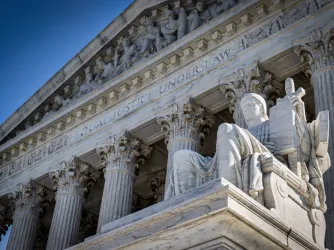Table of Contents
VICTORY: Stanford adopts FIRE recommendation, will no longer notify students accused of engaging in protected speech

Shutterstock.com
Student checks notifications on her mobile phone on the Stanford University campus. Thanks for Stanford's recent updates to its Protected Identity Harm reporting system, students, who can now speak more freely on campus with less fear.
After months of public criticism, Stanford University has revised its Protected Identity Harm Reporting system, which now better promotes the culture of free expression it promises the community, and is required to provide under California law.
Stanford says its PIH Reporting system “is focused on providing support for students who have been harmed from bias,” and outlined a process for administrators to reach out to alleged offenders to ask them to engage with submitters in “restorative justice”-style mediation to resolve the issue. The process came under intense scrutiny in January after a student filed a report about a photo of a peer holding Adolf Hilter’s autobiography, “Mein Kampf.” Reports indicated administrators were “in ongoing conversation with the individuals involved” and were working with the students to “address” the incident.
We wrote Stanford about how this process seriously chills protected speech and can constitute a punishment in and of itself. We told Stanford it should undertake a cursory review of PIH complaints before notifying the accused student. If the alleged conduct constitutes only protected expression, the university can still support the complainant without notifying or involving the accused.
Stanford administrators have long emphasized that the PIH reporting system is “not a judicial or investigative process,” and that undergoing a resolution process is voluntary. However, FIRE is frequently concerned when administrators ask students to engage in any formal process stemming from their protected speech. That can even include coming in for “informal” or “educational” meetings where the context or subtext suggests punishment could follow. This is because the power differential between students and university administrators with disciplinary authority is so significant that students are less likely to perceive these kinds of “requests” as genuinely voluntary. Systematizing these processes like the PIH did is likely to chill students from expressing views for fear of getting pulled into this process.
FIRE was also concerned that the process’s “goals” — “Acknowledgment of Harm” and “Accountability and steps taken towards change” — may have constituted compelled speech and thought reform.
After an underwhelming Feb. 1 response from Stanford insisting no one was being investigated or punished, FIRE remained concerned. Stanford faculty also expressed serious reservations about the system, telling The Wall Street Journal it was creating a culture of fear around speech.
But Stanford would soon be facing even more pressure to protect free expression after the international headline-making shoutdown of a federal judge at Stanford Law School in March. Stanford Law School’s dean forcefully re-committed the law school to free speech, and Stanford’s president made similar statements. It’s hard to imagine these developments didn’t play a role in administrators taking a second look at the PIH reporting system, which FIRE learned was recently revised.

Stanford says it’s not punishing the student photographed reading ‘Mein Kampf.’ Here’s why that’s not good enough.
University responds to FIRE’s letter by insisting that no student is being “punished or investigated for reading a book,” instead citing concerns raised by other students about a social media photo.
Now, the FAQ section of the PIH website incorporates the exact change we asked Stanford to make: It reads, “Offending parties are not contacted.” Also, a PIH incident is now defined as conduct or an incident that occurs outside academic engagement, which alleviates our concern about potential targeting of comments from students or professors germane to classroom discussions. The university additionally will maintain PIH reports in its records, but will use them only for data collection and will keep them separate from anyone’s disciplinary or academic record — unless, of course, reports reveal actionable harassment or unlawful discrimination that administrators are legally obligated to share with another office.
While revisions to the PIH reporting system will no longer implicate students for protected speech, offended students won’t be without resources: They can still receive mental health support and opportunities to engage in restorative practices.
Stanford’s recent free speech efforts — including updating its PIH Reporting System — represents a big win for Stanford students, who can now speak more freely on campus with less fear. Ideally, on this issue, Stanford will be a role model to other colleges and universities that have similar reporting mechanisms.
Recent Articles
Get the latest free speech news and analysis from FIRE.

The federal charges against Don Lemon raise serious concerns for press freedom

The American people fact-checked their government

California prohibits its teachers from talking about a student's gender identity to their parents. That raises First Amendment concerns.



